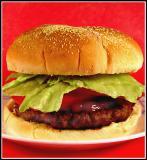
I’ve long been fascinated by food origin myths—particularly the stories of how today’s popular foods came to be. The more you read these types of stories (such as who invented the ice cream sundae), the more you notice some common themes, such as these:
The sole inventor. One common element of food origin stories is that the item in question was fabricated by a single person. Food origin myths speak to the fundamental human need for certainty. It just isn’t satisfying to think that a lot of people were making ground beef patties in the mid-to-late 19th Century, that many of them started serving the patties on various types of bread, including soft white buns (which were becoming more popular after the Civil War), and there were many names for such sandwiches but one of them—hamburger—over the course of decades won out and became an iconic food. It’s much more dramatic to think of a single moment when a single person executed the deed. We prefer the certainty and good stories to the messy, ambiguous facts of history.
The Eureka! Moment and the Last Minute Improvisation. Just as there’s something compelling about the concept of a sole inventor, if the circumstances under which he or she conceives the invention are dramatic, then the story is just that much better. Sir Isaac Newton’s being hit on the head by an apple and coming up with the concept of gravity all at a flash makes for a much better story than his puzzling a theory out over the course of years, informed by lots of reading and discussions with friends and colleagues. The same is true in food origin myths. It’s rare to hear a story about how a café owner experimented for years with new sandwich combinations, introducing a long line of duds (smoked salmon, olives, and green beans on toast, anyone?) before finally finding a combination of corned beef and sauerkraut on rye that people seemed to like and ordered again and again.
The Hamburger
The hamburger provides a great example of food origin myths at work, and--in classic food myth fashion--there are many competing stories. Most of them demonstrate the elements of the sole inventor and the last-minute improvisation. These stories can be found in a range of sources, but Linda Stradley's "History of Hamburgers" at What's Cooking America provides a good compilation. A few representative examples:
- Hamburger Charlie: 15-year-old Charlie Nagreen from Seymore, WI, was having little luck selling meatballs from a cart at the 1885 Outagamie County Fair. Deciding that business was slow because it was too hard to eat meatballs while walking around the fair, he had the brainstorm to flatten out the meat and server it between two slices of bread. His creation was an instant hit, and Nagreen returned to the fair to sell them every year until his death in 1951, earning the nickname "Hamburger Charlie".
- The Menches Brothers: Frank and Charles Menches, traveling fair concessionaires from Akron, Ohio, were working the fair at Hamburg, NY, in 1885 when they ran out of pork for their sausage-patty sandwiches. The local butcher had stopped slaughtering pigs because it was too hot, but he offered the brothers ground beef instead, which they substituted in their sandwiches, naming their creation "Hamburgers" after the town.
- Louis Lassen: Louis Lassen, proprietor of a lunch wagon in New Haven, CT, specialized in selling steak sandwiches to local factory workers. One day a customer in a hurry asked for something quick that he could eat on the run, so Louis ground up some scraps of steak and served them between two slices of bread.
In many versions of the Louis Lassen story the explanation is more mundane: Louis was an economical guy and came up with the hamburger as a way to use up leftover steak scraps. This latter story makes much more sense than a last-minute idea for a hurried customer (after all, would a sandwich made from ground meat scraps be any quicker or more portable than a regular steak sandwich?). But, the improvisational details add drama to the story and make it all the more compelling.
And that's why we love these stories so much.



1 comment:
Very interesting. We all want to be the first and best.
Post a Comment